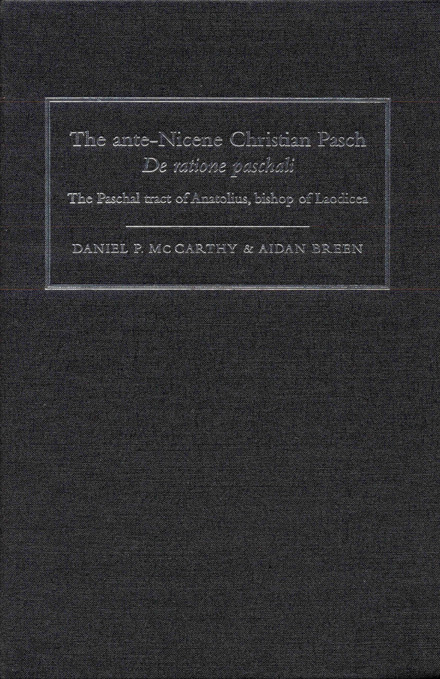The Ante-Nicene Christian Pasch. De Ratione Paschali
The paschal tract of Anatolius, bishop of Laodicea
Daniel P. McCarthy & Aidan Breen
'McCarthy & Breen deserve great praise for bringing De Ratione paschali back to our attention, and for the critical edition of the text; they bring great learning to its exposition, and also demonstrate that it is not an Insular concoction intended to justify the Latercus', Leofranc Holford-Strevens, Peritia.
‘Modern scholarship seems to be as divided on the history of the ecclesiastical establishment of the date of the Easter as the early church officials themselves were. One point of dispute is whether a text on a nineteen-year cycle known as De ratione paschali was a sixth- or eight-century Irish forgery foisted on a third-century Syrian bishop called Anatolius or whether it was the genuine work of Bishop Anatolius. Anatolius is the authority on which the Celtic church based its eighty-four-year cycle calendar, which led to the clash with the Roman church at the Synod of Whitby in 664. Just when the mainstream of scholarship seemed to have come down on the side of the fraudulent nature of the De ratione paschali, Daniel McCarthy, a computer expert interested in the history of computus, argued that the text was, after all, authentic. He based his argument on a mathematical analysis of the astronomical tables in the text found in a late-ninth- or early-tenth-century manuscript discovered by Dáibhí Ó Cróinín (Padua, Biblioteca Antoniana, I 27); McCarthy published his results in 1996 in Archive for History of Exact Sciences. In this book he has joined forces with the historian and Latinist Aidan Breen to present his arguments with a new edition, based on the eight known manuscripts, accompanied by translation, detailed commentary, and reproductions of all the early witnesses to Anatolius’s text. The placing of the De ratione paschali back in the last decades of the third century rather than three centuries or more later, and crucially, before the Council of Nicaea in 325, will necessitate a rewriting of the history of the Paschal controversy, for which Charles W. Jones’s hundred page discussion in his preface to Bede’s Opera de temporibus (Cambridge, Mass., 1943) remains the standard account … [T]he authors deserve thanks for presenting the authentic source for the Insular computists of the early Middle Ages’, Charles Burnett, Speculum: A Journal of Medieval Studies (January 2009).
